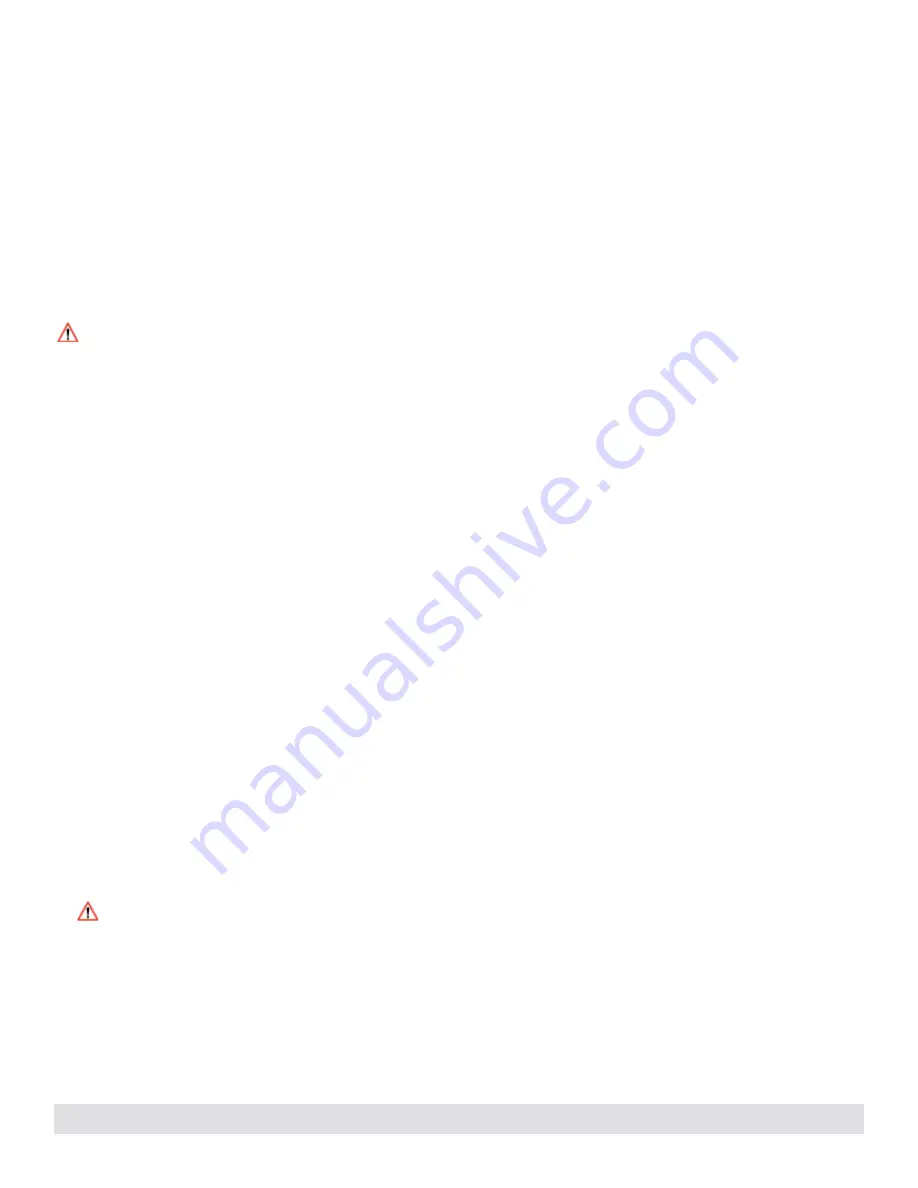
27
PERFORMING SUPER CHLORINATION/
NON-CHLORINE SHOCK TREATMENT
A weekly or monthly super chlorination (1.5 tsp dichlor/950 liters) or shock
(4tbs mps/950 liters) may be required of your chosen sanitation program.
Increasing chlorine to 5 ppm for 24-48 hours removes excess waste and
chloramines from the water. Sodium dichlor is 6x stronger than MPS
and may be a more appropriate for those users that experience heavy
bather load conditions. Operate all jets and leave the cover open for
a minimum of 20 minutes to allow the oxidizer gas to vent to prevent
damage and discoloration to the cover and pillows after administering
a super chlorination or shock to your spa. This type of damage is
considered chemical abuse and is not covered under the terms of the
limited warranty.
IMPORTANT:
Always allow the Free Available Chlorine to fall below 5
ppm before using your spa.
DANGER:
Never leave an open spa unattended, especially if there
are children present!
MANUAL CHLORINE (SODIUM DICHLOR)
Watkins Manufacturing Corporation recommends the use of
MONARCH
Concentrated Chlorinating Granules (sodium dichlor) for sanitizing the
water. Sodium dichlor is preferred because it is totally soluble, dissolves
quickly, and is nearly pH neutral. The recommended Free Available
Chlorine (FAC), the amount of available chlorine sanitize the spa, 3.0-5.0 ppm.
If the FAC is too low:
Increase the FAC by adding granulated sodium
dichlor.
If the FAC is too high:
Allow time to pass and the FAC level will
naturally drop over time.
If the spa smells of chlorine:
super chlorinate or shock the spa FAC
chlorine does not have an odor whereas combined spent chlorine
(chloramines) has a strong chlorine odor that can be eliminated by
shocking the water.
IMPORTANT:
There are several forms of stabilized chlorine available for
use in spas and swimming pools. It is extremely important to choose one
specifically designed for spas. Use of an incorrect product such as tri-
chlor which has a very low pH (2.6) and dissolves too quickly in hot water,
results in extremely high levels of chlorine that
WILL
cause damage to
your spa. Use of a liquid or compressed bromine/chlorine or unapproved
sanitizer
WILL
damage your spa and is specifically not covered under
the terms of the limited warranty.
MONARCH
OZONE MAINTENANCE
If Reduced or no ozone bubbles are coming from the heater return
(clogged ozone injector) or no ozone, clean the injector:
1. Place 0.5 liter of white vinegar into a cup or bucket.
2. Carefully loosen the long tubing attached to the bottom of the
ozonator, located in the equipment compartment.
DANGER: Place the end of the tubing into the vinegar, making
certain that the end of the tubing sits at the bottom of the container.
3. Run the spa until all of the 0.5 liter of vinegar is gone. This should
allow an ample flow of vinegar to be run through the injector and clear
the blockage.
4. Reinstall the tubing to the bottom of the ozonator.
Water chemistry damage is not covered by the warranty. The chemical
levels and water quality in the spa are under your direct control. With
proper basic care, the spa will provide many years of hot water relaxation.
If you are unsure about any chemical or its usage in the spa, contact your
Authorized Dealer, or Watkins Manufacturing Corporation.
DO:
Add all chemicals slowly into the filter compartment with the jet
pump operating for ten minutes.
Use special care if using baking soda to clean either the interior or
exterior plastic surfaces.
IMPORTANT:
Watkins Manufacturing Corporation DOES NOT
recommend the use of any floating chemical dispenser. Damage to
the spa shell or components caused by a floating chemical dispenser
is specifically not covered under the terms of the limited warranty.
Floating dispensers can become trapped in one area and cause an
over-sanitization or release large chunks of sanitizer that very quickly
chemically burn the shell and cover.
DON'T:
Use compressed sanitizers.
Use a floater type sanitization system as a low or no maintenance
solution to your spa maintenance program.
Use a sanitizer which is not designed for spas.
Use swimming pool (muriatic) acid to lower pH.
Use household bleach (liquid sodium hypochlorite).
Broadcast or sprinkle the chemicals onto the water surface. This
method may cause chemically-induced spa surface blistering
(chemical abuse).
VACATION WATER CARE
INSTRUCTIONS
If you plan to be away from home, follow these instructions to ensure that
the water quality of your spa is maintained:
SHORT TIME PERIODS (3-5 DAYS):
1. Adjust the pH by following the instructions outlined in the Water
Quality and Maintenance section.
2. Sanitize the water by following the shock procedures also listed in the
Water Quality and Maintenance section.
3. Lock your cover in place using the coverlocks.
4. Upon your return, sanitize the water by following the shock
procedures, and balance the pH.
LONG TIME PERIODS (5-14 DAYS):
Prior to leaving:
1. At least one day before you leave, set the temperature to its lowest
level. This setting should represent an approximate water temperature
of 80°F (27°C)
IMPORTANT:
Spa water oxidizers such as sodium dichlor (chlorine)
maintain their level of effectiveness substantially longer in warm water
80°F
(27°C)
than in hot water 101°F to 104°F (38°C - 40°C).
2. Adjust the pH as required. Sanitize the water by following the shock
procedures.
Upon your return:
3. Sanitize the water by following the shock procedures. Return the set
temperature to its original setting. The spa water will be safe for you
to use once the Free Available Chlorine residual level has dropped
below 5.0 ppm.
Water Quality and Maintenance
Summary of Contents for Aventine
Page 1: ...VACANZA SERIES 2 0 1 7 O W N E R S M A N U A L 5 0 H z...
Page 38: ......
Page 39: ......



































